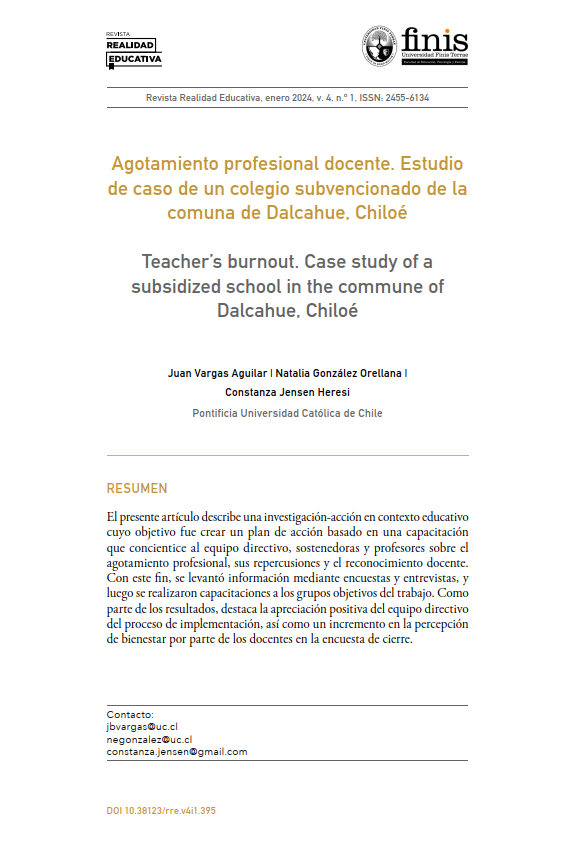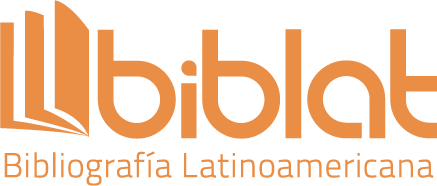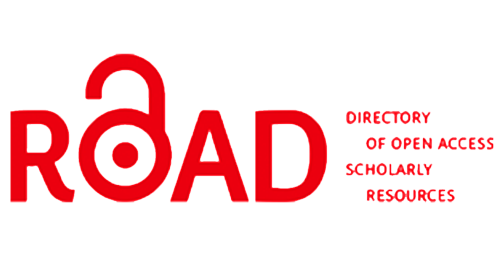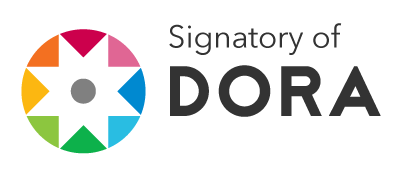Agotamiento profesional docente
Estudio de caso de un colegio subvencionado de la comuna de Dalcahue, Chiloé
DOI:
https://doi.org/10.38123/rre.v3i2.395Keywords:
Professional teachers burnout, burnout, recognition, investigation-actionAbstract
This article describes an action-research in an educational context whose objective was to create an action plan based on training that raises awareness among the management team, owners and teachers about professional burnout, its repercussions and teacher recognition, to carry out measures that increase the sense of well-being in educators. For this, information was collected through surveys, interviews and then training was carried out for the target groups of the work, in order to create the action plan. As part of the main results, the management team's positive appreciation of the implementation process stands out, as well as an increase in the perception of well-being by teachers in the closing survey.
Downloads
References
Andrews, H. (2011). Apoyando a los maestros de calidad con reconocimiento. Revista Australiana de Formación del P rofesorado, 36(12), 59-70. https://doi.org/10.14221/ajte.2011v36n12.5
Arias Galicia, F. y Juárez García, A. (Coord.). (2012). Agotamiento profesional y estrés: hallazgos desde México y otros países latinoamericanos. Editorial Miguel Ángel Porrúa.
Arón, A y Milicic, N. (2000). Desgaste profesional de los profesores y clima social escolar. Revista Latinoamericana de Psicología, 32(3), 447-466. https://repositorio.uc.cl/handle/11534/28806
Ávalos, B. y Valenzuela, J. P. (2016). Education for all and attrition/retention of new teachers: A trajectory study in Chile. International Journal of Educational Development, 49, 279-290. https://doi.org/10.1016/j.ijedudev.2016.03.012
Balayar, B. y Langlais, M. (2022). Parental Support, Learning Performance, and Socioemotional Development of Children and Teenagers During the Covid-19 Pandemic. The Family Journal, 30(2), 174-183. https://doi.org/10.1177/10664807211052496
Carrasco-Aguilar, C. y Luzón Trujillo, A. (2019). Respeto docente y convivencia escolar: significados y estrategias en escuelas chilenas. Psicoperspectivas, 18(1), 1-11. http://dx.doi.org/10.5027/psicoperspectivas-vol18-issue1-fulltext-1494
Colegio de Profesores (18 de mayo de 2021). La seudo normalidad y el agobio laboral que viven los docentes en pandemia. https://www.colegiodeprofesores.cl/2021/05/18/la-seudo-normalidad-y-el-agobio-laboral-que-viven-los-docentes-en-pandemia/
Cuesta Moreno, O. J. (2019). Funciones del reconocimiento en la práctica educativa. Teoría de la Educación. Revista Interuniversitaria, 31(1), 81-101. https://doi.org/10.14201/teri.19011
Dinham, S. y Scott, C. (2002). Awards for teaching excellence: Intentions and realities. Australian Association for Research in Education Conference, Brisbane, 1-5 diciembre.
Eligeeducar (2021). Estudio proyecta que podrían faltar más de 26 mil docentes idóneos para 2025. https://eligeeducar.cl/notas-sobre-nuestros-estudios/estudio-proyecta-que-podrian-faltar-mas-de-26-mil-docentes-idoneos-para-2025/
Engel de Abreu, P., Neumann, S., Wealer, C., Abreu, N., Coutinho Macedo y E., Kirsch C. (2021). Subjective Well-Being of Adolescents in Luxembourg, Germany, and Brazil During the Covid-19 Pandemic. Journal of Adolescent Health. 69(2), 211-218. https://doi.org/10.1016/j.jadohealth.2021.04.028
Feixas, M y Zellweger, F. (2020). Premios docentes con impacto: más allá del reconocimiento a la excelencia. Red U, 18(1), 193-209. https://doi.org/10.4995/redu.2020.13249
Gaete Silva, A., Castro Navarrete, M., Pino Conejeros, F. y Mansilla Devia, D. (2017). Abandono de la profesión docente en Chile: Motivos para irse del aula y condiciones para volver. Estudios Pedagógicos (Valdivia), 43(1), 123-138. https://dx.doi.org/10.4067/S0718-07052017000100008
García-Huidobro, J. E., Treviño, E. y Montecinos, C. (2016). Informe ejecutivo de resultados y propuestas [Mesa sobre Ley 20.501, Condiciones para la Docencia y Agobio Laboral], Chile. https://www.mineduc.cl/wp-content/uploads/sites/19/2016/03/Info-Mesa-de-Condiciones-Agobio-23-FEB-2016.pdf
Hargreaves, A. y Fullan, M. (2014). Capital profesional: transformar la enseñanza en cada escuela. Morata.
Hernández, R., Fernández, C. y Baptista, M. (2014). Metodología de la investigación (6.ª ed.). McGraw-Hill Education.
Hodges, T. (8 de mayo de 2017). Why appreciating teachers is more important than you think. Gallup. https://news.gallup.com/opinion/gallup/210041/why-appreciating-teachers-important-think.aspx
Leithwood, K. (2009). Cómo liderar nuestras escuelas: aportes desde la investigación. Fundación Chile.
London, R. (2020). When schools reopen, don’t neglect recess. Phi Delta Kappa International, 102(1), 26-27. https://www.jstor.org/stable/10.2307/26977138
Majluf, N. (2011). Los desafíos de la gestión. El Mercurio Aguilar.
Malbrán, V. (2022). Importancia de la gestión educativa como variable en la prevalencia del síndrome de burnout en docentes secundarios en Chile [tesis de magíster, Pontificia Universidad Católica de Chile]. https://repositorio.uc.cl/handle/11534/63260
Maslach, C. y Jackson, S. E. (1981). MBI: Maslach Burnout Inventory. Manual. University of California, Consulting Psychologists Press. https://www.researchgate.net/publication/277816643_The_Maslach_Burnout_Inventory_Manual
Maslach, C., Schaufeli, W. y Leiter, M. (2001). Job burnout. Annual Review of Psychology, 52(1), 397-422. https://doi.org/10.1146/annurev.psych.52.1.397
McCollum, S. (2001). How Merit Pay Improves Education. Educational Leadership, 58(5), 21-24.
Ministerio de Educación. (2015). Marco para la Buena Dirección y el Liderazgo Escolar. https://hdl.handle.net/20.500.12365/2239
Movsessian, J. (2018). The Need for Teacher Recognition and its Impact on School Culture [tesis de magíster, California State University, San Marcos]. http://hdl.handle.net/10211.3/206437
Müller, M., y Baum, A. (2020). The Code and Covid-19. National Association for the Education of Young Children, 75(4), 72-77. https://www.jstor.org/stable/10.2307/27011136
OECD. (2012). The importance of teacher recognition [Policy brief]. Teaching in Focus, 1. https://doi.org/10.1787/5k4220vw98ms-en
OECD. (2019). TALIS 2018 Results (Volume I): Teachers and School Leaders as Lifelong Learners . TALIS, OECD Publishing. https://doi.org/10.1787/1d0bc92a-en
Salanova, M., Bresó, E. y Shaufeli, W. B. (2005). Hacia un modelo espiral de las creencias de eficacia en el estudio del burnout y del engagment. Ansiedad y Estrés, 11,(2-3), 215-231. https://www.wilmarschaufeli.nl/publications/Schaufeli/243.pdf
Simonsen, E. (9 de abril de 2021). El 20% de profesores se retira en los primeros 5 años de vida laboral y las especialidades más críticas son educación parvularia y media. CIAE. https://www.ciae.uchile.cl/index.php?page=view_noticias&id=2206&langSite=es
Stringer, E. (2007). Action Research (3a. ed.). Sage Publications.
Thompson, S. C. y Spacapan, S. (1991). Perceptions of control in vulnerable populations. Journal of Social Issues, 47(4), 1-21. https://doi.org/10.1111/j.1540-4560.1991.tb01831.x
Tralma, D. (14 de octubre de 2020). La otra cara del regreso a clases: licencias médicas de profesores crecieron hasta un 353% en la Región Metropolitana. Vergara 240. https://vergara240.udp.cl/licencias-medicas-de-profesores-crecieron-hasta-un-353-en-la-region-metropolitana/
Véliz-Burgos, A. y Dörner-Paris, A. (2020). The Individual Versus the Community in Times of Health Crisis. Propósitos y Representaciones, 8(SPE1), e502. http://dx.doi.org/10.20511/pyr2020.v8nSPE1.502

Published
How to Cite
Issue
Section
License
Copyright (c) 2024 Juan Vargas Aguilar, Natalia González Orellana, Constanza Jensen Heresi

This work is licensed under a Creative Commons Attribution-NonCommercial-NoDerivatives 4.0 International License.
Los contenidos de esta revista se distribuyen bajo una licencia Atribución/Reconocimiento-NoComercial-SinDerivados 4.0 Internacional.












